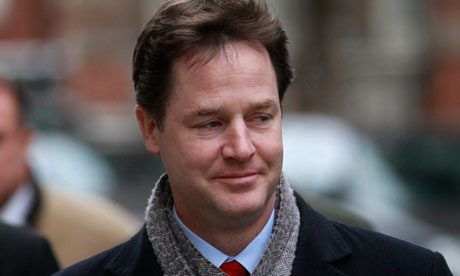Student fees: more protests planned for defining day
Most Liberal Democrat MPs expected to vote for trebling of tuition fees, in face of further mass action

In what is set to be a defining day for English universities and politics, most Liberal Democrat MPs are expected today to join their party leader, Nick Clegg, to force through a trebling of university tuition fees, in the face of what are likely to be angry student street protests and bitter recriminations at Westminster.
Following a late flurry of concern that the coalition's notional Commons majority of 84 was being seriously eroded, David Cameron and the chancellor, George Osborne, last night met as many as 10 potential Tory rebels, mainly on the party right, to order them back into line.In a further index of the fraught atmosphere, yesterday, the Liberal Democrat whips at one point demanded the energy secretary, Chris Huhne, make the 5,000-mile trip home from the climate change summit in Cancún, Mexico, to vote. Later, it emerged he would stay at the summit.
In a further sign of the stresses, Simon Hughes, the party's deputy leader, told his local party he would be abstaining from the vote at the end of this evening's five-hour debate.
Hughes said he was considering his position following a meeting with his constituency party last night. "My local party members have asked me to rebel against and break the [coalition] agreement."
Hughes made his decision to abstain despite playing a prominent role in winning three last-minute concessions from the business department covering scholarships, part-time students and the £21,000 repayment threshold.
Other Liberal Democrat ministers, such as the schools secretary, Sarah Teather, found themselves hounded by TV cameras as they left their homes, refusing to answer reporters' questions.Clegg has ensured that all 17 Liberal Democrat government ministers in the Commons will vote for the increase in tuition fees, and is optimistic that another dozen backbench MPs will join him in what he has described as "going through the fire". That would mean a majority of his parliamentary party backing him, but as many as 20 will stick to their election pledge and vote against, including two former leaders, Charles Kennedy and Sir Menzies Campbell.
Conservative and Labour whips expect an overall majority of about 30 for the increase, but it has become the first serious test of the coalition's coherence since the election in May.
In a media blitz, Clegg accepted that, before the election, he had pledged to get rid of tuition fees over two parliaments, but insisted "to govern is to choose, especially in coalitions". He said he was not "going to apologise for a second for choosing to put money" towards poor children in schools.
He admitted the coalition was struggling to explain its policy because of the "scary" £9,000 upper limit on tuition fees. Asked on Radio 5 Live why he had been unable to explain why the new system would be fairer, the deputy PM said: "Partly because the figure which has, in a sense, been caught in the headlights is the £9,000 figure. In fact the £9,000 figure is only going to happen on an exceptional basis. Because that is such a simple, big, scary figure, no one perhaps is looking beyond that headline and asking what does it mean in terms of how you repay."
But in a sign that the Tory right is unhappy at the proposals, Peter Bone, the Conservative MP for Wellingborough and a member of the executive of the Tory backbench 1922 committee, said he was considering voting against the rise in tuition fees. Bone said his colleagues were thinking of rebelling because of their unease about the coalition. "This isn't about tuition fees. It is about politicians saying one thing to get elected and a different thing when they are in government … I am a Conservative, I am not a coalitionist."
And a group of university vice-chancellors published a letter last night arguing that the cost of the student loan scheme was so expensive that there would be no net savings to the exchequer.
There were calls for the policing of today's protests – which are expected to see tens of thousands of demonstrators target Westminster – to be restrained. Last night, 28 signatories, including activists, students, journalists and an MP, put their names to a letter urging the police to respond to the protests "in a peaceful manner".
The Labour MP Jon Cruddas, the activist and musician Billy Bragg, the NUS president, Aaron Porter, and about a dozen groups of students who are occupying their universities signed the letter, which said that protesters had resorted to direct action after being "comprehensively let down by the parliamentary process".
It added: "Following the emergence of compromising video footage of police protest tactics in recent weeks, the relationship between officers of the law and the public, a large proportion of whom support the students and school pupils in their cause, is already imperilled."
